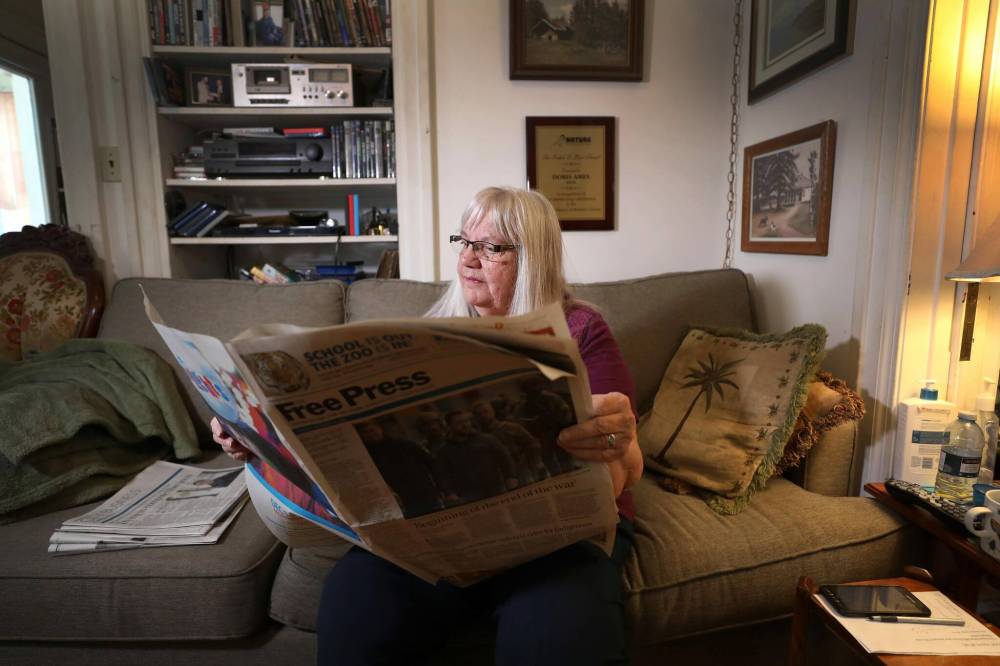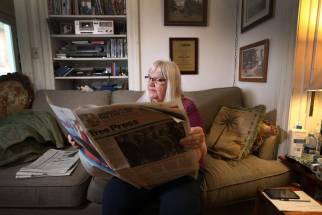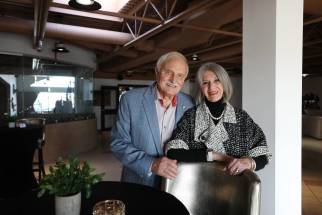Linked by ink Proud to be part of something building bonds through words and ideas for 150 years
Read this article for free:
or
Already have an account? Log in here »
To continue reading, please subscribe:
Monthly Digital Subscription
$0 for the first 4 weeks*
- Enjoy unlimited reading on winnipegfreepress.com
- Read the E-Edition, our digital replica newspaper
- Access News Break, our award-winning app
- Play interactive puzzles
*No charge for 4 weeks then price increases to the regular rate of $19.00 plus GST every four weeks. Offer available to new and qualified returning subscribers only. Cancel any time.
Monthly Digital Subscription
$4.75/week*
- Enjoy unlimited reading on winnipegfreepress.com
- Read the E-Edition, our digital replica newspaper
- Access News Break, our award-winning app
- Play interactive puzzles
*Billed as $19 plus GST every four weeks. Cancel any time.
To continue reading, please subscribe:
Add Free Press access to your Brandon Sun subscription for only an additional
$1 for the first 4 weeks*
*Your next subscription payment will increase by $1.00 and you will be charged $16.99 plus GST for four weeks. After four weeks, your payment will increase to $23.99 plus GST every four weeks.
Read unlimited articles for free today:
or
Already have an account? Log in here »
Hey there, time traveller!
This article was published 25/11/2022 (1115 days ago), so information in it may no longer be current.
Some years ago, I wrote a really bad column. To be clear, it wasn’t the first time something I’d put in the paper landed with a thud, nor was it the last; they can’t all be winners. Brains (at least my brain) aren’t reliable machines. Quality control leaves a little something to be desired. You can put them to work pushing out words, but they don’t always function.
The point is: I wrote a piece that sucked, and for the most part, readers were nice enough to look the other way, the same as you do when you see someone accidentally walk into a street lamp. It’s a kindness. I did get one email though, that made no bones about how nonsensical and self-absorbed the reader thought the piece was.
He wasn’t wrong, but at that moment, feeling a little vulnerable, I fired off a response that vented how sensitive I was feeling. “I’m a person,” I wrote, that much I remember. I’m a person. I’m sorry you didn’t like it, some columns won’t be for everyone and sometimes I just don’t get it right, but I’m still a person, and emails like this hurt.
A week later, a card arrived in my mailbox at work. I opened it. Inside was the most gracious handwritten note; the reader apologized for how his first message had come across. What he wrote then was so thoughtful, so caring, it made me realize with a jolt that, though this reader and I had never met, in his mind, we were not actually strangers.
To me, the email came from an anonymous corner. But to him, I was a friend. I’d been in his home every weekend.

I still have that card, tucked away along with other handwritten notes readers have sent over the years. I am a child of the digital era, and so responding to physical mail is not a strong suit. But I always read those notes. I always save them. And I always remember that someone gave their time to ensure the conversation we have, in these pages, goes both ways.
There’s something I want us to understand, about each other. It’s a strange thing, being a writer. We are speaking, and most importantly, as a matter of public value, we are conduits through which others speak; but we cannot see who is listening. We know there is an audience, otherwise we wouldn’t have jobs, but it’s difficult to visualize its scope.
Trust me on this. There’s just no way to picture tens of thousands of people reading your stories. It feels theoretical.
Trust me on this. There’s just no way to picture tens of thousands of people reading your stories. It feels theoretical.
So: words I write at 6 a.m. in my bed, or at 10 p.m. at a rural Boston Pizza, or at a curling rink, or during an air-raid siren in the basement of a hostel in wartime Kyiv: all of these, from my perspective, go off into a void. And once they leave my brain, the words are no longer mine: good or bad, they live then only how readers perceive them. And, in a way, so do I.
That relationship, that connection, is special. It requires trust, on both sides. One reason, over the years, that I leaned into being more personally present in writing and on social media is that it seemed right that readers should see me; who I am inescapably colours how I see and report things, so it seems key information for readers to evaluate my pieces.
Still, I had to trust that people I’d never know would be willing to see me. Not as words on a page. Just as a person.
What I found, the more I opened up, is that readers were waiting to meet us. That to so many of you, the Free Press is not just paper and ink, or pixels on the screen, but a dialogue, a conversation. Our paper is part of your lives. So even if you’ve only known us through a name and an old headshot, you’ve chosen to extend that trust to us too.
And we do see you. We hear you. Sometimes, my colleagues and I pour glasses of wine and swap stories about our readers, regaling each other with tales of the most memorable, the most colourful, and the ones who, above all, stun us every month with the depth of their care not just for us, but most of all for the community we share.
We don’t always see the outcomes of our stories, but when we do it makes real the connection that otherwise is so hard to wrap our minds around.
Two summers ago, in the middle of a brutal heat wave, I wrote about how the group Mutual Aid Winnipeg was trying to get cooling devices to vulnerable elders and low-income families. The response from readers was a tsunami, so overwhelming I spent most of that day responding to emails, passing along information about how they could help.
One reader called me to say he’d just bought out the entire stock of one model of fan from Canadian Tire, and needed to know where to drop them off. By the end of that day, Free Press readers had donated over 200 fans and portable air conditioners. I’d always known our readers were capable of remarkable things, but that still left me speechless.
When my father died, readers embraced me. When I adopted a senior cat, one reader began regularly writing to check in not just on me, but on the kitty; when that cat died, one of the first things that popped into my mind was what I’d say when that reader next emailed me. It was almost as hard to break the news to her as it was to live it.
In March, when my colleague Mikaela MacKenzie and I went to Poland to document the humanitarian impact of the war in Ukraine, I wrote about a woman who was planning to come to Manitoba; this summer, I ran into her on a Winnipeg street. She had good news, as we embraced: a Free Press reader had tracked her down to offer her a prime job in her field.
We’re an independent paper, one of a dwindling few. By Manitoba, for Manitoba, and that’s thanks to you.
More than anything else, this part of the work is what affirms to us — and, yes, I’m speaking for colleagues — that what we are doing here matters. We don’t always see the outcomes of our stories, but when we do it makes real the connection that otherwise is so hard to wrap our minds around, so hard to imagine beyond the theoretical.
Every day, we send stories into the void, knowing but not quite believing that tens of thousands of people see them. But our readers are there, and they are listening, and they care about the place where they live and the people who live in it. To have the chance to be a conduit for those dialogues is a privilege. We can’t always see it, but we never forget it.
And when I read the letters readers sent in about their connection with the Free Press, which we gathered together to celebrate our history in this community, I am amazed, again, by the many ways in which people relate to the work that goes on at the paper. The stories that brought you in; the stories that made you stay; the little moments you remember.
What I hear in those letters is that for our readers, the Free Press feels like home. It feels like the Manitoba you know.
It feels like the comics you savoured as a kid, the ad where you met your husband, the voice of your neighbours. I get it: it’s home for me too. We’re an independent paper, one of a dwindling few. By Manitoba, for Manitoba, and that’s thanks to you.
For 150 years, you’ve been with us. There are many words one could say about that, but I need only one: we are grateful.
melissa.martin@freepress.mb.ca
Our newsroom depends on a growing audience of readers to power our journalism. If you are not a paid reader, please consider becoming a subscriber.
Our newsroom depends on its audience of readers to power our journalism. Thank you for your support.










